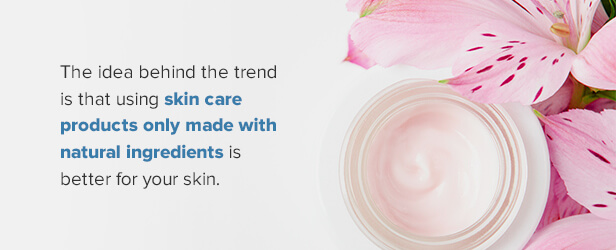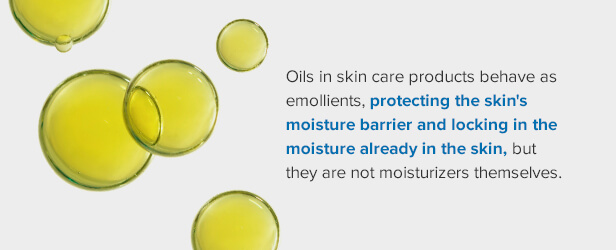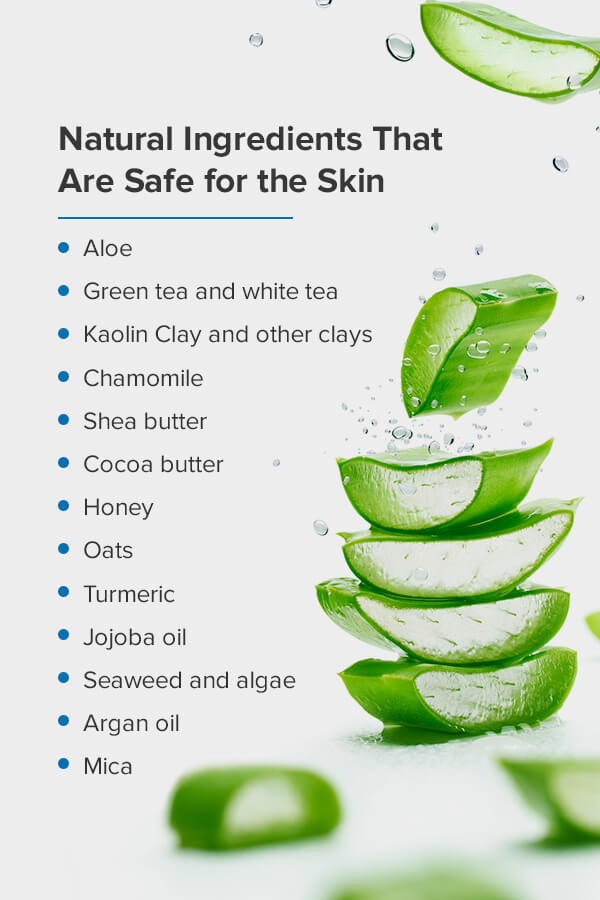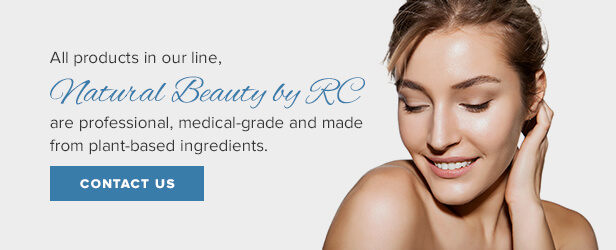The natural skin care industry is huge, and the media today is full of stories about new natural skin care products that are supposedly more effective and safer for skin — some are even safe enough to eat. Behind this trend is a consumer desire to shy away from certain chemicals and artificial ingredients they’ve deemed unsafe, and a shift towards the eco-friendly, healthy essence these natural products provide.
However, when applied to skin care products, the term “natural” can be very vague and unregulated, so a little research is necessary to know what’s actually safe to use. Most truly natural products are safe and effective, but it’s good to know what’s actually safe and what’s just a trendy buzzword. In this guide, we’ll discuss:
- What Does Natural Skin Care Mean?
- Fewer Ingredients Doesn’t Always Mean Better
- Check Your Natural Products’ Shelf Life
- Avoid Fragrances
- Avoid Heavy Oils
- Is Natural Skin Care Effective?
- Is Natural Skin Care Safe?
What Does Natural Skin Care Mean?
Natural skin care is a trend that many people seem to be embracing these days. The idea behind the trend is that using skin care products only made with natural ingredients is better for your skin. These products can be store-bought or made at home from common ingredients. Many of today’s conventional skin care products contain chemicals and ingredients that many people are trying to avoid.
The problem is that we see a lot of people getting into this trend without truly understanding just what natural skin care means, or why they should or shouldn’t use certain products and ingredients.
So, what is natural skin care? Unfortunately, there isn’t a clear answer, because legally the term “natural” doesn’t mean anything. While certain other designations like “vegan” or “organic” are regulated, any product or company can use the term “natural,” and there are no governing bodies or organizations that regulate the use of the term.
Many companies want to capitalize on the movement towards more natural products — in all industries — and use terms like “all-natural” on their product packaging and advertising to entice consumers. But these types of labels mean nothing, and this type of advertising is called greenwashing — cashing in on the trend towards natural, by making consumers believe that their products are more natural than they really are.
Nevertheless, the natural skin care industry is booming. It used to be that natural skin care products could only be found in small co-ops and markets, but today new product lines have flooded the market, and even well-known, traditional brands and big box stores are making more room in their lines for more naturally inclined products.
It’s generally assumed that natural skin care products contain a majority of ingredients found in nature or safer versions of synthetic ingredients, while leaving out certain harmful chemicals and synthetics known for their potential to cause harmful side effects.
Fewer Ingredients Doesn’t Always Mean Better
We’ve been told that longer ingredient lists often mean more additives. To live a more natural life, many consumers look for simpler lists of ingredients, with names they can pronounce. While this is great advice for foods, and for some types of skin care products, there is more to it than just simply looking for a list containing fewer ingredients.
The problem with this advice is that it doesn’t take into account the fact that some ingredients need to be mixed with other ingredients in order to be effective or have a longer shelf life.
Many organic and natural skin care ingredients need other ingredients to make them absorbable through the skin, and due to the nature of these natural ingredients, sometimes other ingredients are needed to keep them stable and prevent spoilage. It’s a better idea to understand what the words in the ingredient lists mean and how these ingredients function in the final product.
Check Your Natural Products’ Shelf Life
One of the downsides to using natural skin care products is that they tend to not last as long as other types of products. Preservatives and other artificial ingredients are what give other products a much longer shelf life, and most natural skin care products lack these ingredients.
Skin care products made from natural ingredients may only have a shelf life of a few months. It’s important to keep an eye on the expiration date — for both natural and non-natural products — as the product can start to turn, smell differently and lose effectiveness after its expiration date.
Some natural products can last a little longer if kept in the fridge, but not too far past the expiration date. Opaque, air-tight packaging can also help natural products keep from spoiling early. Choosing packaging that dispenses the product instead of dipping fingers into it is also a good idea with natural products, in order to avoid bacterial contamination.
Avoid Fragrances
Most skin care products have some type of fragrance, either naturally from other ingredients or on their own. Sometimes, fragrances are added to cover up the scent of other ingredients in the product. Fragrances in many skin care products smell nice and can make us feel pampered when we use them, adding to the experience. Skin care companies know this and entice us with their fragranced products.
Both natural and more conventional products can contain fragrances, and the fragrances themselves can be synthetic ingredients or natural ones, like essential oils. Some people are more sensitive to scents and react with sneezing and sniffling, but it’s not just the nose that’s affected by fragrances.
One of the leading causes of skin sensitivity and other negative skin reactions is fragrance in skin care products, even for those without sensitive skin or allergies. Fragrance can cause an immediate reaction for anyone with sensitive skin, but even if there is no initial sign of irritation, the damage can be cumulative.
It can be difficult to determine if a product will be sensitizing just by smelling it. Sometimes a product may have no discernible scent at all, but still have fragrance ingredients added. Look for words like fragrance, aroma, perfume or parfum in the ingredients list to denote synthetic fragrances added.
Unfortunately, some natural scents and essential oils can also be sensitizing. Peppermint, citrus oils, bergamot, geranium and cinnamon may all smell amazing, but they can be irritating to the skin for some people.
Luckily, there are some natural ingredients that are non-irritating, great for the skin and still smell amazing, such as cocoa butter, shea butter and aloe vera. Others include cucumber, almond, melon, mango, coconut and vanilla. Aside from safe ingredients such as these, it’s best to look for products labeled as “fragrance-free.”
Avoid Heavy Oils
There are so many differing opinions on oils in skin care that it can be confusing to make sense of it all. Different types of oils can be found in face creams, cleansers and other skin care products, and it’s becoming more popular to use natural oil products on the skin. But, it’s important to know that the type of oil you use matters, and some are better for specific skin types than others.
When using skin care products containing oils, the most important thing to note is the comedogenic factor of the oil, or how likely the product is to clog pores. A scale from zero to five is used to rank oils on their comedogenic factor, and any products rated at a two or less are considered non-comedogenic. Anyone with acne or blemish-prone skin should be especially aware of this and only use non-comedogenic skin care products.
Oils in skin care products behave as emollients, protecting the skin’s moisture barrier and locking in the moisture already in the skin, but they are not moisturizers themselves. Moisturizing products are humectants and add moisture to the skin by pulling in moisture from the environment around you.
Oily skin care products sit on the surface of the skin, and some can clog pores if a heavier oil is used and the skin is prone to blemishes. Coconut oil has enjoyed a lot of popularity lately in everything from cooking to skin care, but for many people, this oil is too heavy for the face, and can easily clog pores. For anyone with acne-prone skin, coconut oil is best avoided on the face.
Lighter oils such as sweet almond, jojoba and argan oil are usually fine for facial products, and it may take some trial and error to find the ones that work best for your skin. Some heavier oils may also work when used in body care products, but the face is more sensitive and needs lighter products.
High-quality noncomedogenic oils like almond oil, grapeseed oil and others can be very beneficial for all skin types, providing vitamins and anti-oxidants to the skin and protecting the moisture barrier.
Is Natural Skin Care Effective?
Natural skin care products have been around for a long time, but have more recently been in the spotlight, as more consumers are concerned with the ingredients they put on their bodies. So, it’s natural to wonder if these natural products are as effective as their non-natural counterparts.
We know that many natural ingredients are safe for skin, but are they as effective for specific purposes, like deep moisturizing, anti-aging or acne prevention?
There’s a common misconception that because natural products are made from common, recognizable ingredients, they won’t be as effective as the lab-created chemical-laden ones. But this is far from the truth. The effectiveness of a product generally depends on the product itself and the skin type of the individual using it.
Both completely natural ingredients and lab-created synthetic ingredients can be very effective for protecting and enhancing the appearance of the skin. What matters is the molecules of the ingredients and how they are used by the skin. Some ingredients can be both found in nature and synthetically created, but both versions are the same at the molecular level.
Depending on the particular ingredients used, natural skin care products can be very effective for most people. Many of these ingredients have been used for hundreds of years, and it’s only very recently that people have relied more on products with synthetic ingredients.
It’s best to use tried-and-tested ingredients known to be safe for skin. If you’re not sure which ingredients or products are best for your skin, a dermatologist or clinician can help find the right ones for you.
Is Natural Skin Care Safe?
As with the level of efficacy for these products, the safety of natural skin care products depends on the product and the individual ingredients that make it up. Just because an ingredient is plant-based, organic or “natural” doesn’t necessarily make it safe for skin care products. Take poison ivy, for example. It’s completely natural, but you wouldn’t want it on your skin.
Similarly, certain other plant ingredients can cause irritation or other unwanted side effects. Most natural products are completely safe, but it depends on the skin type and sensitivities of the person using it, too. Alternatively, there are many synthetic ingredients that are perfectly safe, and others that can be dangerous.
Many natural ingredients are perfectly safe when applied to the skin, including many oils, herbs, plants and other common ingredients. These ingredients are gentle and can produce great results. However, many synthetic ingredients are also very safe and effective, as well.
Natural Ingredients That Are Safe for the Skin
These natural ingredients are generally safe for most people and skin types:
- Aloe
- Green tea and white tea
- Kaolin Clay and other clays
- Chamomile
- Shea butter
- Cocoa butter
- Honey
- Oats
- Turmeric
- Jojoba oil
- Seaweed and algae
- Argan oil
- Mica
Natural Ingredients That Are Dangerous for the Skin
However, “natural” doesn’t always mean “safe.” Some natural ingredients that can be harmful to your skin include:
- Alcohol
- Citrus juices and oils — lime, lemon, grapefruit, etc.
- Cinnamon
- Bergamot oil
- Peppermint and other mints
Synthetic Products That Are Safe for the Skin
Alternatively, “synthetic” doesn’t always mean “unsafe.” Some examples of synthetic products that are safe for most skin types are:
- Sodium benzoate
- Silicones and binders
- Boron nitride
- Dimethicone
Synthetic Products That Are Dangerous for the Skin
These synthetic ingredients, however, can be damaging when applied to the skin:
- Fragrance, perfumes
- Parabens
- Sodium Lauryl Sulfate (SLS) and other sulfates
- Triclosan
- Formaldehyde
- Polyethylene Glycol (PEG)
- Toulene
- Petrolatum
- Artificial colors
- Oxybenzone
Natural Skin Care at Rejuvenation Clinic of Sauk Prairie
As a premier skin care destination, Rejuvenation Clinic of Sauk Prairie offers a full range of skin treatments and services. Plus, we have our very own line of natural skin care products. All products in our line, Natural Beauty by RC, are professional, medical-grade and made from plant-based ingredients.
You’ll find everything you need — from cleansers and moisturizers to masks, serums and special treatments, as well as a full anti-aging line. We’ve specially developed these products to be safe and effective, and all of them work in conjunction with our in-office treatments and procedures.
Contact us today for an appointment, so a clinician can recommend the right mix of treatments and skin care products, personalized just for you.






